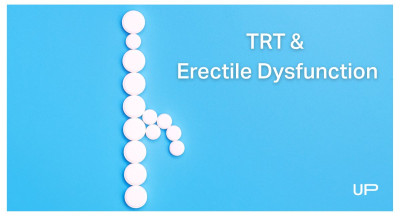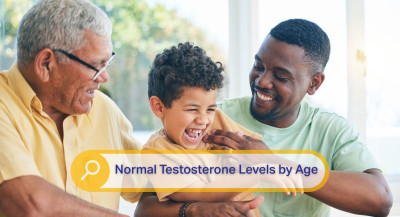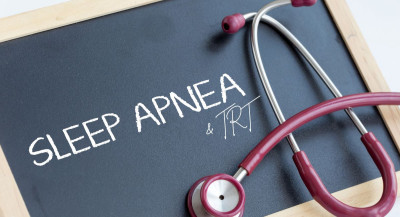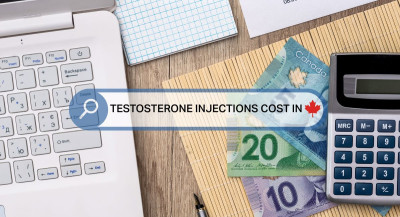TRT Vs Steroids: What Sets Them Apart?
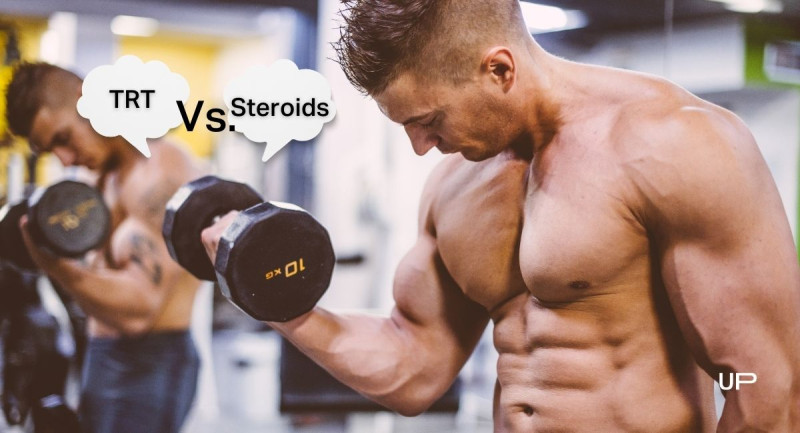

Many men in Canada hear the word “testosterone” and immediately think of steroids.
It’s a common misunderstanding that links testosterone replacement therapy (TRT) in Canada with illegal performance-enhancing drug use.

But while both involve testosterone, they’re not the same in purpose, dosage, or risk. Confusing TRT with anabolic steroid abuse can lead to hesitation about getting real medical help, or worse, self-medicating without guidance.
Understanding the difference matters, especially for men seeking safe, effective treatment for low testosterone symptoms.
Topics covered in this article:
- What Is TRT?
- What Are Anabolic Steroids?
- Key Differences Between TRT and Steroids
- Health Risks: TRT vs Steroid Abuse
- Dispelling Common Myths
- What to Do If You’re Considering TRT
- UPGUYS Help in Canada
- Conclusion: TRT Isn’t Steroids, and That’s a Good Thing
- Frequently Asked Questions (FAQs)
- References
What Is TRT?
Testosterone replacement therapy (TRT) is a medically supervised treatment designed to restore testosterone to normal, healthy levels. It is prescribed to men who have been diagnosed with low testosterone through proper lab testing and clinical evaluation. The goal of TRT is not muscle building or performance enhancement, but to relieve symptoms of testosterone deficiency, such as fatigue, low libido, mood changes, and decreased muscle mass.

TRT is typically offered in the form of injections, topical gels, or other regulated delivery methods. In Canada, TRT must be prescribed and monitored by licensed healthcare providers who ensure safe dosing and ongoing follow-up. The focus is on maintaining physiological hormone levels, not pushing them beyond what the body would naturally produce.
What Are Anabolic Steroids?
Anabolic steroids are synthetic substances that mimic the effects of testosterone. They are often used in high doses to build muscle mass or boost athletic performance, especially in bodybuilding circles. Unlike testosterone replacement therapy (TRT), which is prescribed to correct a medical deficiency, anabolic steroid use is typically done for physical enhancement and not under medical supervision.
In Canada, anabolic steroids are classified as controlled substances. Using them without a prescription is illegal and can carry serious legal and health consequences. Common side effects of anabolic steroid abuse include mood swings, liver damage, cardiovascular problems, infertility, and hormonal imbalances. Long-term misuse can also lead to psychological dependence.
Understanding the difference between these two is important for anyone considering hormone therapy or concerned about the safety of testosterone treatments.
Key Differences Between TRT and Steroids
While testosterone replacement therapy (TRT) and anabolic steroids both involve testosterone, their purpose, dosage, and level of medical oversight are entirely different. Understanding these distinctions is essential for making informed health decisions.
Here’s how TRT and steroids compare:
Purpose:
- TRT is used to treat clinically low testosterone levels to restore normal hormonal balance.
- Anabolic steroids are typically used for performance enhancement or muscle gain, often in non-medical contexts.
Dosage:
- TRT uses physiological doses aimed at returning testosterone to normal ranges.
- Steroid users often take much higher doses, well above what the body would naturally produce.
Oversight:
- TRT is prescribed, monitored, and adjusted by licensed healthcare professionals.
- Steroids are frequently self-administered without medical supervision, increasing the risk of side effects and long-term harm.
This difference in intent and regulation is why TRT is a legitimate medical therapy in Canada, while anabolic steroid use for performance purposes remains illegal and risky.
Health Risks: TRT vs Steroid Abuse
Understanding the different health risks tied to medically supervised TRT and anabolic steroid misuse is essential. Here’s a clear, fact-based comparison:
TRT (Under Medical Supervision)
- TRT is generally safe when properly prescribed and monitored. Common side effects include elevated red blood cell count (polycythemia), fluid retention, mild mood shifts, and possible worsening of existing sleep apnea. Severe complications are rare when dosing is controlled.

Anabolic Steroid Abuse
Using anabolic steroids — especially in high, non-therapeutic doses — can lead to serious and sometimes lasting health problems:
- Cardiovascular damage: increased blood pressure, altered cholesterol levels, heart attack, stroke.
- Liver injury: hepatotoxicity and liver tumours, particularly from orally taken steroids.
- Hormonal and reproductive issues: testicular shrinkage, sperm production reduction, infertility, and breast tissue enlargement.
- Psychiatric effects: aggression or "roid rage," mood disorders, depression, dependence, and cognitive impairment.
- Other risks: acne, baldness, immune dysfunction, organ damage, and psychological dependence.
Why This Comparison Matters
- TRT aims to restore healthy hormone levels under close supervision, with minimal risk.
- Steroid abuse, even of the same hormone, pushes levels beyond normal, causing widespread harm across multiple organ systems.
This underscores why TRT is a valid treatment for low testosterone, whereas steroid misuse poses significant health dangers.
Dispelling Common Myths
Let’s clear up two major misconceptions surrounding TRT and steroid use:
“Roid Rage” Isn’t Linked to TRT
The term “roid rage” refers to heightened aggression seen in some individuals who take anabolic steroids—particularly at very high, non-medical doses. Studies show that medically supervised TRT at physiological levels does not increase aggression. In fact, many men report improvements in mood, energy, and overall sense of well-being after starting TRT.
TRT Isn’t Addictive
Although anabolic steroid abuse can lead to dependence and withdrawal, there's no strong evidence to suggest that TRT—when used as prescribed—causes addiction or chemical dependence. TRT is a medical therapy aimed at restoring hormone balance, not enhancing mood or performance beyond natural levels.
What to Do If You’re Considering TRT
If you're thinking about starting testosterone replacement therapy (TRT) in Canada, it’s important to approach it the right way. TRT is a medical treatment that should never be self-diagnosed or self-administered.
Here are the essential steps to take:
- Get tested: Start with a blood test to check your testosterone levels. Your doctor may order tests for both total and free testosterone, usually done in the morning.
- Understand the symptoms: Common signs of low testosterone include fatigue, low libido, difficulty concentrating, mood changes, and reduced muscle mass.
- Consult a qualified healthcare provider: Work with a licensed doctor who can assess your overall health and determine if TRT is appropriate.
- Ask the right questions: Make sure you understand the risks, benefits, and what monitoring is required during treatment.
- Avoid black-market products: Only use testosterone prescribed by a medical professional. Unregulated steroids or testosterone from non-medical sources can be dangerous and illegal in Canada.
Choosing TRT is not about performance enhancement. It's about restoring balance and improving quality of life under proper medical guidance.
UPGUYS Help in Canada
If you’re considering testosterone replacement therapy (TRT) in Canada, UPGUYS makes it easier, safer, and more accessible. We connect you with licensed Canadian doctors who specialize in hormone health and follow strict medical guidelines.

Here’s how we support you:
- Lab testing and diagnosis: Our doctors can issue lab requisitions to confirm low testosterone levels before treatment begins.
- Personalized treatment plans: We don’t believe in a one-size-fits-all approach. Your care plan is built around your health profile and needs.
- Ongoing support: Follow-ups, dosage adjustments, and monitoring are included. We ensure your treatment stays effective and safe.
- No hidden fees: There are no charges for consultations, lab requisitions, or prescription shipping.
- Convenience: All of this is handled online, with medication discreetly delivered across Canada.
UPGUYS is committed to helping men get legitimate TRT care—not underground steroids or unsafe shortcuts. We’re here to guide you every step of the way.
Conclusion: TRT Isn’t Steroids, and That’s a Good Thing
Testosterone replacement therapy (TRT) in Canada is not the same as abusing anabolic steroids—and that’s a critical distinction. Medically supervised TRT is designed to restore hormone balance, not push your body to unsafe extremes. When prescribed appropriately, TRT can improve energy, mood, sexual health, and overall quality of life without the dangers linked to unsupervised steroid use.
If you’re dealing with symptoms of low testosterone, the smartest move is to work with a licensed medical provider who can guide you through testing, treatment, and follow-up. Real care, real results—and no risks you don’t need.
Frequently Asked Questions (FAQs)
Yes. TRT is legal in Canada when prescribed by a licensed healthcare provider to treat medically diagnosed low testosterone (hypogonadism). It must be obtained through a pharmacy with a valid prescription.
TRT aims to restore testosterone to normal physiological levels under medical supervision. Anabolic steroid use typically involves high, often unsafe doses to boost muscle growth and performance, usually without medical oversight.
When managed properly, TRT has a much lower risk profile than steroid abuse. While any hormone therapy carries potential side effects, risks are minimized through appropriate dosing, regular lab monitoring, and medical supervision.
TRT is not intended for muscle enhancement or performance boosting. It may help restore normal energy and muscle maintenance in men with low testosterone, but it does not produce the rapid gains seen with steroid abuse.
No. Self-medicating with testosterone is unsafe and illegal in Canada. Unregulated products may contain harmful substances, incorrect dosages, or no active hormone at all. Always go through a licensed provider.
References
UPGUYS has strict sourcing guidelines to ensure our content is accurate and current. We rely on peer-reviewed studies, academic research institutions, and medical associations. We strive to use primary sources and refrain from using tertiary references.- Risks of testosterone replacement therapy in men, PubMed,
https://pmc.ncbi.nlm.nih.gov/articles/PMC3897047/ - Anabolic Steroids, NIH,
https://www.ncbi.nlm.nih.gov/books/NBK482418/ - Anabolic steroid misuse, NHS,
https://www.nhs.uk/conditions/anabolic-steroid-misuse/
This article is written for informational purposes only and does not constitute medical advice. The information provided in the articles cannot and should not replace advice from a healthcare professional. Talk to your healthcare provider about any physical or mental health concerns or the risks and benefits of any treatment or medication.
